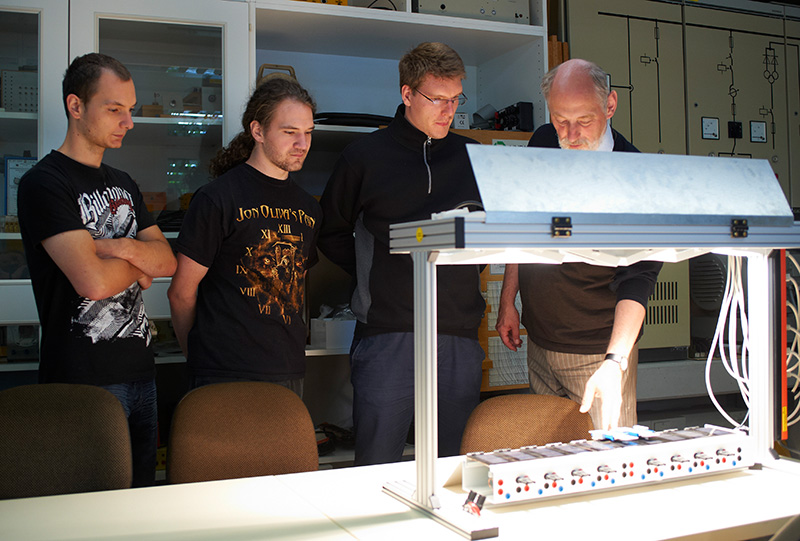
Power Engineering and Renewable Energies
In A Nutshell
Profile
Renewable energies play an important role for the energy supply of the future. This creates great challenges for prospective engineers. In the academic program of power engineering and renewable energies, Coburg University trains the engineers of the future. The focus lies on the engineering sciences with emphasis on storage and distribution of renewable energy.
Projects
The program is designed specifically for the requirements of professional practice. Students also work in teams with students from other academic programs, thereby training their social skills. Specific projects with industrial partners challenge students to present their work results confidently and establish contacts in the profession. In addition, almost all courses are accompanied by exercises in which students can apply their theoretical knowledge in a practical setting.
Practical Training
Basic internship
A basic internship is not required. However, before the start of the program, we recommend practical experience in corresponding companies, so you can get an idea of the professional work environment ahead of time.
Required internship
The required internship semester usually takes place in the fourth semester of the program. It spans a contiguous period of 18 weeks. In addition, students will visit educational events to accompany their practical training.
Structure of the Program

The first three semesters focus on the general fundamentals in subjects, such as mathematics, physics, computer science, English, and business administration as well as electrical engineering principles (digital technology, electronic construction elements and circuit technology, micro-computer technology, electrical drives and grids, signals and systems, and principles of control and feedback control technology).
The required internship (fourth semester) gives students the opportunity to apply their knowledge to industrial questions and get to know the potential applications of electrical engineering and information technology. In the following semesters (semesters 5-7), students study the special contents of the subject area "renewable energies" in more depth.
The following subjects are compulsory:
- Control technology, e.g. for constant grid frequency
- Converter technology for feeding in electr. energy
- Fluid dynamics and thermodynamics as the physical basis for the conversion of wind or heat, for example, into electric energy
- Electrochemistry and battery technology
- Electric energy generation with generators
- Photovoltaics and wind energy
- Electric energy distribution and intelligent grids
Specialization options
The second program segment (semester 5-7) lets students choose from these application-oriented specialization subjects:
- Solar thermal
- Photovoltaics
- Hydro-power and pump storage
- Hydrogen technology
- Fuel cell technology
- Battery technology
- Intelligent grids – distributed energy structures
- Smart grids
- Automation technology for renewable energies
Curriculum and Examination Regulations
The [study plan]* provides an overview of the structure of the program. The [module manual]* provides information about the content of the individual modules. The [study and examination regulations]* form the legal basis for the study program. Contact your academic advisor Prof. Dr. Jochen Jirmann concerning the content of the program.
*only available in german at the moment
Job Perspectives
Leaving nuclear energy is challenging Germany's energy sector to rely on alternative energies. Renewable energies play an essential role in this endeavor. Electrical engineers will be needed in the future who can apply their well-founded knowledge to the production, storage, and distribution of renewable energies.
Master's degree
After completing the Bachelor’s degree, good graduates have the possibility of obtaining further qualifications with a Master's degree. For this purpose, Coburg University offers the following Master’s degrees:
- Electrical Engineering and Information Technology
- Computer Science
- Development and Management in Mechanical Engineering
- Simulation and Testing
These programs continue directly after the Bachelor’s degree.
Application and Admission Requirements
Here you can find all the important information about evaluating your school-leaving certificates and learning German in order to start a bachelor program at the University of Coburg.
Since the program is taught in German, you also have to prove your knowledge in German before the start of studies (level C1/C2).
Status: December 2019.
Further and current informations can also be found on the German website of this course.
